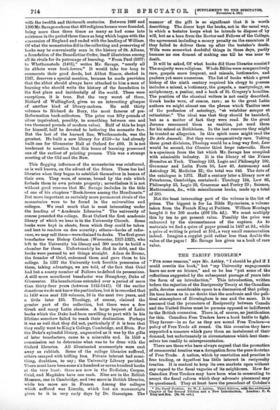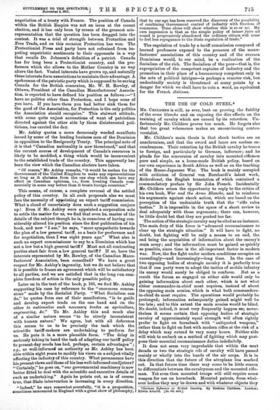THE TARIFF PROBLEM.* " Fos some reasons," says Mr. Ashley,
" I should be glad if I could rewrite the book," but "my University engagements leave me now no leisure," and so be has "put some of the reflections suggested by the subsequent passage of years into the form of an introduction." This introduction, written before the rejection of the Reciprocity Treaty at the Canadian polls, devotes considerable space to a discussion of that policy. Its tone leaves us in no doubt that the academic and the poli- tical atmosphere of Birmingham is one and the same. It is assumed that the promoters of Reciprocity between Canada and the United States must be persons opposed or indifferent to the British connexion. There is, of course, no justification for this. Canadian Free Traders have a hard battle to fight. They favour—in so far as they are sound Free Traders—a policy of Free Trade all round. On this occasion they have supported a measure which gave them an instalment of their demand, but unfortunately in circumstances which lent them- selves too readily to misrepresentation.
There are those who have always argued that the promotion of commercial treaties was a derogation from the pure doctrine of Free Trade. A nation, which by conviction and practice is free trading, en hypothesi has little interest in reciprocity treaties. It is content to keep its own markets open without any regard to the fiscal vagaries of its neighbours. How far Canadian Free Traders may have been wise in consenting to accept the fiscal reform which they advocate piecemeal may be questioned. They at least have the precedent of Cobden's • The Tariff Problem. By W. J. Ashley. Third Edition, with the additional Chapter of the Second Edition and a New Introduction. London; P. S. King and Son. Ma 6d. net.).
negotiation of a treaty with France. The position of Canada within the British Empire was not an issue at the recent election, and it has only been by means of the grossest mis- representation that the question has been dragged into the contest. It was a trial of strength between Protection and Free Trade, and on this occasion Protection has won. The Protectionist Press and party have not refrained from im- puting unpatriotic sentiments to their opponents in a way that recalls Dr. Johnson's definition of a patriot. Canada has for long been a Protectionist country, and the pre- ference which she allows to the Mother Country in no way alters the fact. Vested interests have grown up, and naturally these interests form associations to maintain their advantage. A spokesman of the patriotic party which is supposed to be saving Canada for the British connexion, Mr. W. H. Rowley, of Ottawa, President of the Canadian Manufacturers' Associa- tion, is reported to have defined his position as follows :—" I have no politics other than Protection, and I hope none of you have. If you have them you had better sink them for the good of the Association, for Protection is the only politics the Association should recognize." This stalwart attitude, with some quite unjust accusations of want of patriotism directed against the other side by these disinterested poli- ticians, has carried the day.
Mr. Ashley quotes a more decorously worded manifesto issued by some of the leading business men of the Dominion in opposition to the Reciprocity Treaty. The principal note of it is that " Canadian nationality is now threatened," and that
the current course of development of Canada's resources is likely to be modified, a thing which would be inconvenient to the established trade of the country. This apparently has been the view which the Canadian electors have taken.
c' Of course," Mr. Ashley remarks, "it would be useless for the Government of the "United Kingdom to make any representations so long as it abstains from the one step which can have any effect on Canadian opinions, i.e., from treating Canada com- mercially in some way better than it treats foreign countries."
This means, of course, a complete reversal of the settled policy of this country. In all such proposals also we must face the necessity of appointing an expert tariff commission.
What a cloud of uncertainty does such a suggestion conjure up ! Even if Mr. Ashley were appointed a corporation sole to settle the matter for us, we find that even he, master of the details of the subject though he is, is conscious of having con- siderably altered his position since the first publication of his book, and now " I am," be says, "more sympathetic towards the plan of a low general tariff, as a basis for preference and for negotiation, than I was eight years ago." What also is such an expert commissioner to say to a Dominion which has not a low but a high general tariff ? Must not all contracting parties start fair from a low general tariff ? If so, have the interests represented by Mr. Rowley, of the Canadian Manu- facturers' Association, been consulted? We have a great respect for Mr. Ashley's ingenuity, but we do not believe that it is possible to frame an agreement which will be satisfactory to all parties, and we are satisfied that in the long run com- plete freedom of action is the only possible policy.
Later on in the text of the book, p. 165, we find Mr. Ashley supporting his case by reference to the " enormous conces- sions" made by the Socialist Party. " What Socialism can do," he quotes from one of their manifestoes, "is to guide and develop export trade on the one hand and on the other to nationalize such necessary trades as agriculture, engineering, &c." To Mr. Ashley this and much else of a similar nature seems "to be utterly inconsistent with human nature." We agree, but with all deference this seems to us to be precisely the task which the scientific tariff-makers are undertaking to perform for us. He puts it in a more plausible form. " The delay in seriously taking in hand the task of adapting our tariff policy to present-day needs has had, perhaps, certain advantages "; e.g., so well-informed an authority as Mr. Ashley has been able within eight years to modify his views on a subject vitally affecting the industry of this country. What permanence have his present views and those of his less well-informed coadjutors? " Certainly," he goes on, " our governmental machinery is now better fitted to deal with the scientific and executive details of such an undertaking." Again he points out, as is of course true, that State intervention is increasing in every direction.
" Indeed," he says somewhat scornfully, "it is a proposition, sometimes announced in England with a great show of philosophy, that to our age has been reserved the discovery of the possibility of combining Government control of industry with freedom of commerce. Time alone will show whether this is so or no. My own impression is that as the simple policy of laisser faire ad round is progressively abandoned the ordinary citizen will come to feel less repugnance to the State regulation of trade."
The regulation of trade by a tariff commission composed of learned professors exposed to the pressure of the manu- facturers' associations of this country and of the oversee Dominions would, to our mind, be a realization of the Socialism of the rich. The Socialism of the poor—that is, the expropriation of the competent captains of industry and the promotion in their place of a bureaucracy competent only in the arts of political intrigue—is perhaps a remoter risk, but undoubtedly society is threatened at many points by a danger for which we shall have to coin a word, an equivalent for the French itatistne.







































































 Previous page
Previous page